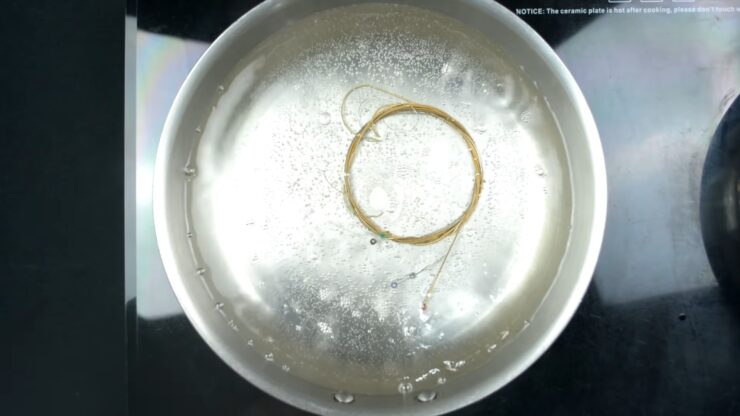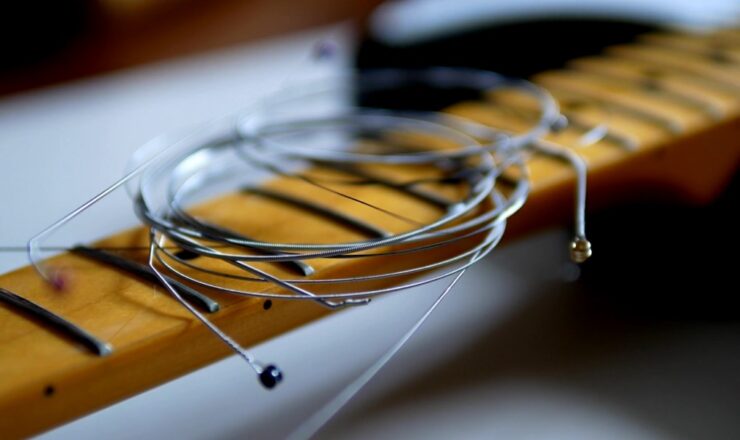As a guitar player, you might have heard of the practice of boiling your guitar strings to extend their lifespan and improve their sound quality. But is this technique really effective, or is it just a myth? In this blog post, we’ll explore the science behind boiling guitar strings and provide you with all the information you need to make an informed decision.
Why Would You Want to Boil Guitar Strings?
Before we dive into whether or not boiling guitar strings actually works, let’s talk about why someone might want to do it in the first place. Guitar strings are made of metal, which means they are susceptible to corrosion and wear over time.
As a result, they will lose their brightness, clarity, and sustain as they age, which can negatively impact your playing experience.
One common solution to this problem is to replace your guitar strings regularly. However, this can be time-consuming and expensive, especially if you play a lot. Boiling guitar strings is often suggested as an alternative way to extend their lifespan and improve their sound quality.

The Theory Behind This Process
The idea behind boiling guitar strings is that the heat will help remove any dirt, oil, or other contaminants that have built up on the strings over time. This, in turn, is supposed to restore the brightness, clarity, and sustain of the strings.
Additionally, the heat from boiling can help to re-align the crystalline structure of the metal in the strings, which can improve their tone and playability. The heat can also cause the metal to expand slightly, which can help to close any gaps or imperfections in the winding, resulting in a smoother, more consistent surface.
How to Boil Guitar Strings
If you decide to try this method, it’s important to follow the proper steps to ensure that you don’t damage them or your guitar. Here’s how to do it:
Step 1: Remove the strings from your guitar.
Step 2: Place them in a pot of water, making sure that they are fully submerged.
Step 3: Bring the water to a boil and let the strings boil for about 10 minutes.
Step 4: Remove the strings from the water and let them cool down.
Step 5: Dry them thoroughly before you restring your guitar.
It’s important to note that you should never boil coated guitar strings, as the coating can be damaged by heat and water.
Does This Actually Work?
Now, the moment of truth: does this method actually work? The answer is yes and no.
On the one hand, boiling guitar strings can help to remove some of the dirt and oil that has built up on them, which can improve their sound quality, at least temporarily. It can also help to re-align the crystalline structure of the metal, resulting in a slightly improved tone and playability.
However, it’s important to keep in mind that boiling guitar strings is not a magic solution to all of your string woes. If your strings are already worn out, boiling them won’t magically make them sound brand new again. Additionally, boiling can actually cause the metal in the strings to weaken and become more brittle, which can lead to them breaking more easily.
Furthermore, boiling your strings can also cause damage to your guitar if you’re not careful. The heat from the boiling water can cause the glue holding your guitar bridge in place to soften, which can cause the bridge to become loose or even detach from the guitar. This can be a costly repair, so it’s important to be cautious if you decide to opt for this particular method.
Alternatives to Boiling Guitar Strings

If you’re looking for alternative ways to extend the life of your guitar strings, there are several options you can consider. One is to clean your strings regularly using a microfiber cloth or a specialized string-cleaning solution. This can help to remove dirt, sweat, and oil from the strings, which can improve their lifespan and sound quality.
Another option is to try using coated guitar strings, which are designed to last longer than traditional uncoated strings. Coated strings have a thin layer of polymer or other materials that protect the metal from corrosion and wear, helping to extend their lifespan and improve their sound quality.
You can also try using different types of strings, such as those made from various metals or with different gauges. Experimenting with different types of strings can help you find the ones that suit your playing style and preferences best.
Frequently Asked Questions

1. Can boiling guitar strings damage my guitar?
Yes, this method can potentially damage your guitar if you’re not careful. Make sure to remove the strings from the guitar before boiling them, and be careful not to drip boiling water onto your guitar or any other nearby objects.
2. How long should this process last?
You should boil your guitar strings for around 10-15 minutes. Boiling them for longer than this can potentially weaken the metal and cause the strings to break more easily.
3. How many times can I repeat this process?
Boiling guitar strings can cause the metal to weaken over time, so it’s not recommended to boil them more than once or twice. It’s better to replace your strings when they start to lose their tone and playability.
4. Can boiling guitar strings make them sound better?
This method can remove some dirt and oil from the strings and improve their tone and playability temporarily. However, it’s not a one-size-fits-all solution to all of your string problems, and the improvement in sound quality may not be noticeable to all players.
5. Can this method make my strings last longer?
Boiling can potentially extend the lifespan of strings by removing dirt and oil that can cause corrosion and wear. However, it can also weaken the metal and cause the strings to break more easily, so it’s important to be careful when boiling your strings.
6. Are there alternative ways to extend the life of my guitar strings?
Yes, there are several alternative ways to extend the life of your guitar strings, including regular cleaning, using coated strings, and to try different types of strings. Experimenting with different types and gauges of strings can help you find the ones that suit your playing style and preferences best.
Bottom Line
Boiling guitar strings can help to improve their sound quality and lifespan, but it’s not a universal solution to all of your string problems. While it can remove some dirt and oil from the strings and improve their tone and playability temporarily, it can also weaken the metal and cause the strings to break more easily. Additionally, boiling them can potentially damage your guitar if you’re not careful.
If you decide to try boiling your guitar strings, make sure to follow the proper steps to avoid damaging them or your guitar. And if you’re looking for alternative ways to extend the life of your strings, there are several options you can consider, including regular cleaning, coated strings, and trying different types of strings.
We recently wrote about what scales flamenco guitarists use, so make sure to check it out and find out more about the playing techniques of these virtuosos.

